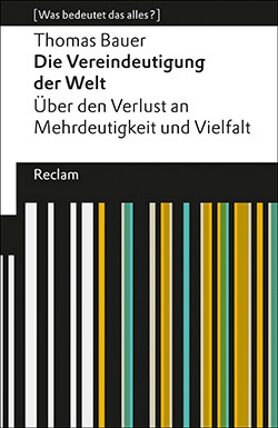Thomas Bauer
Die Vereindeutigung der Welt. Über den Verlust an Mehrdeutigkeit und Vielfalt
[The Decline of Complexity in the World. On the Loss of Ambiguity and Diversity]
- Reclam Verlag
- Ditzingen 2018
- ISBN 978-3-150-19492-8
- 104 Pages
- Publisher’s contact details
Thomas Bauer
Die Vereindeutigung der Welt. Über den Verlust an Mehrdeutigkeit und Vielfalt
[The Decline of Complexity in the World. On the Loss of Ambiguity and Diversity]
Published in Griechisch with a grant from Litrix.de.
Sample translations
The approval of ambiguity
Contradictoriness, applied to the plant world in 2018, means, for example, that 30,000 varieties of maize worldwide contrast with the few dozen that are cultivated on a large scale. Genetically modified varieties from the laboratory of the vegetable monopolist Monsanto dominate the market. Another example: traditional religiosity is in decline worldwide. At the same time, fundamentalist religiosity is on the increase. And to take one further example from the sphere of culture: museums are booming worldwide. Simultaneously, visitors spend no more than a few seconds in front of each picture. In other words, art is becoming part of a general culture of experience; it is booming but at the same time, has become a matter of indifference. ‘An infinity of meaning leads to meaninglessness.’
But what does all this mean – or not mean? Do we have too little variety or too much? Is religion experiencing a boom or is the opposite the case? Is the environment welcoming to art or hostile? With Thomas Bauer we have to reply: all these things are true. And so everything has to be described alongside everything else. But who could put up with that nowadays? Worldwide, we are having to get to grips with populist politicians. They all speak a supposedly clear language and act in pursuit of easily communicable goals. In truth, however, they get caught up in all sorts of contradictions. The greatest contradiction is that democratic elections are won by them with the aid of anti-democratic slogans. As we could see recently in the U.S. midterm elections, this does their popularity no harm. Thomas Bauer has an explanation for this. He diagnoses a rampant inability to come to terms with ambivalences. It is as if ambiguity can scarcely be endured in an increasingly complex world. Which is why it is either denied or else declared to be an end in itself, as occurs frequently in modern art. Bauer has a number of curious examples of this. One such emerged when Daimler AG decided in 1989 to come to terms with its past involvement with National Socialism. It commissioned a sculpture in memory of the victims of forced labour which should be as non-committal as possible. Bernhard Heiliger’s plinthless floor sculpture Day and Night was as abstract as was necessary to avoid calling a spade a spade. ‘Hence the work of art’, Bauer writes, ’had no meaning at all!’
Ambivalence, then, is widely open to abuse. However, Thomas Bauer has something else in mind. His concern is not to complain about the diversity of modern life worlds from the standpoint of cultural criticism, but rather to take us to task for our increasing inability to put up with diversity as such. The clue to our current dealings with it is ‘Meaninglessness is just as lacking in ambiguity as is a single meaning’. In other words, a work of art that is so open-ended that it can mean everything and nothing is just as totalitarian as a work of art that is subject to a state ideology. Transferred to religion, we see the same process at work: ‘Religious fundamentalism and religious indifference are very closely related in fact. They are the consequence of a vanishing tolerance of ambiguity in bureaucratized, high-tech and above all capitalist societies.’ It is not for nothing that one of the most important concerns of the ‘identitarian movement’ is to deliver contradiction-free identities for people who yearn for unambiguous meaning.
In fact, one of the greatest challenges of our age appears to be the difficulty of putting up with differences without going so far as to lapse into permissive apathy. The past career of concepts such as ‘authenticity’ and ‘identity’ leads Bauer back to Freud’s idea of a ‘discontent with culture’. Perhaps surprisingly, new ideas can be found in pre-modern Islam of all places. The Koran is a text that has been handed down in a number of variants. Even Islamic legal authorities have always been divided about the question of what precisely God’s law (sharia) actually asserts and hence unlike today’s IS have largely abandoned drastic punishments. ‘For over 1000 years before the twentieth century, there were almost no cases of adulterers sentenced to death by stoning, let alone executions for consensual same-sex sex acts.’ The compulsion to eliminate all ambiguity, which in the final analysis has led to the labelling of sexual identities in liberal societies, has something to do with modernity’s need for ultimate justifications.
So what does Bauer recommend for our society? We should ‘reduce ambiguity to a liveable degree, without attempting to eliminate it entirely’. For wherever people have tried to abolish complexity everything just became even more confused. And wherever they were unable to see the wood for the sheer quantity of meanings, a dangerous vacuum arose. The increased tendency to allow our decision-making to be taken over by algorithms seems to play into the hands of those who wish to reduce the complexity of the world. This trend should be resolutely opposed. Politics, schools and art in the public sphere are the institutions capable of launching a new practice of tolerating ambiguity.
Translated by Rodney Livingstone

By Katharina Teutsch
Katharina Teutsch is a journalist and critic. She writes for newspapers and magazines such as: the Frankfurter Allgemeine Zeitung, Tagesspiegel, die Zeit, PhilosophieMagazin and for Deutschlandradio Kultur.
Publisher's Summary
What do the disappearance of apple varieties, the appearance of politicians on talk shows, religious fundamentalism and the art and music markets have in common? Everywhere diversity is being diminished; yet unexpected and unadapted things are pushing back. That which is unique in content is being replaced by an alleged authenticity: no longer does the "what" count, just the "how". Thomas Bauer points out the consequences if we continue on this fatal path of loss of diversity.
(Text: Reclam Verlag)
